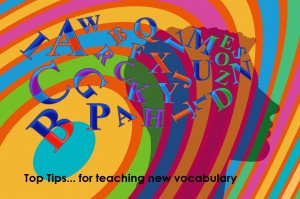Many children with language problems struggle with learning new words. And it’s something that they are constantly expected to do in every school subject, as well as in everyday life – even many out of school activities will use words which may be confusing for a child who finds it hard to remember words. For example, if your child does ballet, they may be expected to know what a plié is, and if they do karate they may be expected to know what gi is.
Here are some tips for teaching new vocabulary. This advice is aimed at children with language problems, but it will be useful for all children.
- Don’t try to teach too many words at the same time – 6-8 target words would be ideal.
- Don’t expect your child to use a word until you know that they understand it really well. If your child can’t consistently find a square from a range of shapes when asked, then they’re not likely to be able to name one yet. Just a word of caution here too – there are some children who can use a word (often in the right context) but don’t actually understand it. This is usually because they have learnt a whole chunk of language, rather than putting their own sentences together. Even if you have heard a child use the word you’re targeting, still check out their comprehension first.
- Teach words in categories. This helps children to store them well in their brains and find them again when they need them. Think of your brain like a filing cabinet, with all the words stored in the right folder. For some children, their internal word store is a bit more like my desk, with bits of paper everywhere! Teaching words in groups (eg zoo animals or clothes or weather words) helps them to file everything back in the right drawers again.
- Repeat, repeat, repeat! Your child is not likely to remember a word the first time you say it (and probably not the second or third either!)
- There’s a saying “I hear and I forget, I see and I remember, I do and I understand”. There is a lot of truth in this. Think back to the ballet class I spoke about earlier. Is your child more likely to remember what a plié is if it was just mentioned or if they spent time watching and then doing it themselves with someone using the word lots while they were doing it? Using visuals really helps eg pictures, colour, video clips etc. But don’t just look and listen, remember your other senses as well. Not all sets of vocabulary lend themselves to being tasted but more can be touched or experienced in some other way!
- Talk about every aspect of a word. Word maps like this one I found can be really helpful. Talk about the sound of the word -see if the child can identify the first and last sound and how many syllables it has. Does it rhyme with anything? Talk about that too. Talk about words which mean the same or the opposite. See if the child can define what it means in their own words. However, take care not to introduce lots of other new words while you’re doing this – remember what the target word is!
- Compare the word with other words that the child already knows. Eg if you were trying to teach the word kitten you would say that it was a baby cat obviously, but you might also say it is small or link it to other baby animal names if they know them eg puppy.
- Teach the word in as many different contexts as possible. Sets of vocabulary picture cards are great but they have their limitations. For example, your child needs to know that that picture of a kitten is not the only kitten in the world, there are lots of others. Eg if the kitten in the picture is black, will they recognise a brown one as being a kitten too when they see one? Point the object or concept out as often as you can in real-life contexts. If you can link it in to something your child is really interested in, you have an even greater chance of success! Eg if you are teaching the word “square” and your child loves Thomas the Tank Engine, point out squares in the Thomas books.
- Don’t forget about the word completely once you’ve taught it. Once you are sure your child knows a word, stop directly focusing on it, but remember to return to it a few weeks later to see if they still remember. We all forget words if we’re not using them regularly eg I don’t recall much of my A-level French!
Finally, try to be patient. It may take some time, but hopefully they will end up with a good, solid knowledge of the words you’re targeting!







Leave a Reply